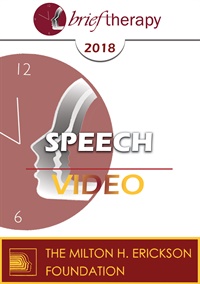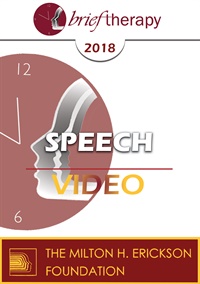Credit available - Click Here for more information
- Average Rating:
- Not yet rated
- Topic Areas:
- Speeches | Psychotherapy | Art and Creativity | Brief Therapy | Resources
- Categories:
- Brief Therapy Conference | Brief Therapy Conference 2018 | Online Continuing Education
- Faculty:
- Stephen Gilligan, PhD
- Course Levels:
- Master Degree or Higher in Health-Related Field
- Duration:
- 1:01:12
- Format:
- Audio and Video
- Original Program Date:
- Dec 09, 2018
- Short Description:
- Therapy is successful when clients are able to experience significantly changed realities. While the identification and transformation of symptoms is important in this regard, the activation of the client's creative capacity to make positive changes is even more important. This paper will explore how the 6-step model of Generative Psychotherapy provides a disciplined yet flexible process for helping clients claim and use their agency for creative change.
- Price:
-
Sale is $29.00
price reduced from Base Price - $59.00
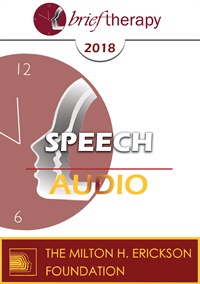
- Average Rating:
- Not yet rated
- Topic Areas:
- Speeches | Brief Therapy | Couples Therapy | Therapist Development | Relationships
- Categories:
- Brief Therapy Conference | Brief Therapy Conference 2018
- Faculty:
- Stan Tatkin, PsyD, MFT
- Duration:
- 1:11:45
- Format:
- Audio Only
- Original Program Date:
- Dec 09, 2018
- Short Description:
- This one-hour speech focuses on what all couple therapists should at least consider: social justice and fairness agreements between partners. The human primate is warlike, self-centered, mostly automatic, and given to flights of fancy, moodiness, and other unpredictable feelings, thoughts, and behaviors. Thus, the social science predicate of civilization dictates that, to hold human beings accountable, there must be agreements between individuals that protect them from one another. Shared principles of governance points to the matter of partners governing each other and everyone else as the couple is the smallest unit of a society. Principles are hierarchically more personal and self-governing than rules or laws. In other words, principles speak to character.
- Price:
- $15.00 - Base Price
Credit available - Click Here for more information
- Average Rating:
- Not yet rated
- Topic Areas:
- Speeches | Relationships | Trauma | Continuing Education | Brief Therapy | Intimacy
- Categories:
- Brief Therapy Conference | Brief Therapy Conference 2018 | Online Continuing Education
- Faculty:
- Laura Brown, PhD
- Course Levels:
- Master Degree or Higher in Health-Related Field
- Duration:
- 1:03:11
- Format:
- Audio and Video
- Original Program Date:
- Dec 08, 2018
- Short Description:
- BT18 Speech 14 - Helping Trauma Survivors to Have the Relationships They Deserve - Laura Brown, PhD Survivors of complex childhood trauma --systemic abuse, neglect, and disrupted attachment schemata -- enter adulthood with internal working models of relationship that often lead them into difficult and painful connections with others. I will address the specific challenges in empowering these survivors to stop "paying the price of admission" to intimacy, and discuss how therapists can find effective strategies for addressing pre-verbal and early verbal core beliefs about self, being lovable, and being safe in relationships.
- Price:
-
Sale is $29.00
price reduced from Base Price - $59.00
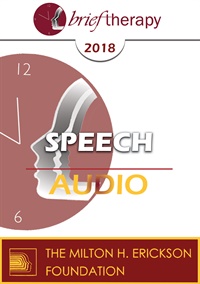
- Average Rating:
- Not yet rated
- Topic Areas:
- Speeches | Brief Therapy | Ericksonian Hypnosis and Therapy Techniques | Therapist Development
- Categories:
- Brief Therapy Conference | Brief Therapy Conference 2018
- Faculty:
- Jeffrey Zeig, PhD
- Duration:
- 1:00:38
- Format:
- Audio Only
- Original Program Date:
- Dec 09, 2018
- Short Description:
- One way of modeling Milton Erickson is to consider the states that he commonly inhabited when he was conducting psychotherapy. Erickson "states" will be described and examples will be provided.
- Price:
- $15.00 - Base Price
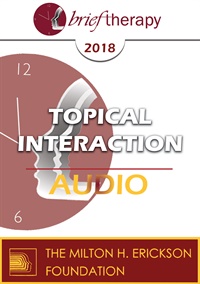
- Average Rating:
- Not yet rated
- Topic Areas:
- Topical Interactions | Brief Therapy | Psychotherapy | Hypnosis | Hypnotic Phenomena
- Categories:
- Brief Therapy Conference | Brief Therapy Conference 2018
- Faculty:
- Michael Yapko, PhD
- Duration:
- 1:00:04
- Format:
- Audio Only
- Original Program Date:
- Dec 08, 2018
- Short Description:
- This presentation will allow for a dialog with attendees regarding the merits of hypnosis, the ways it can be applied clinically, the differences between laboratory and clinical effects on hypnotic responsiveness, and other topics of interest regarding hypnosis.
- Price:
- $15.00 - Base Price
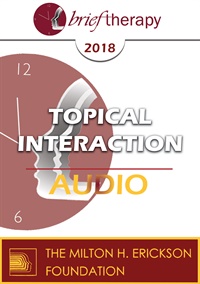
- Average Rating:
- Not yet rated
- Topic Areas:
- Topical Interactions | Couples Therapy | Love | Solution Oriented Approach | Brief Therapy
- Categories:
- Brief Therapy Conference | Brief Therapy Conference 2018
- Faculty:
- Elliott Connie, MA, LPC
- Duration:
- 58:58
- Format:
- Audio Only
- Original Program Date:
- Dec 08, 2018
- Short Description:
- Since the Solution Focused Approach is conversational in nature, and, based on questions, the clinician who is working with couples needs to be comfortable asking these kinds of questions when there are more than one person in the room. This can be tricky due to the nature of couples therapy. This talk will center on how to conduct couples session using this approach and how to use the question process to navigate even the trickiest sessions.
- Price:
- $15.00 - Base Price
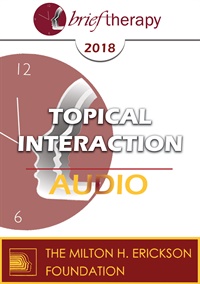
- Average Rating:
- Not yet rated
- Topic Areas:
- Topical Interactions | Anxiety | Brief Therapy | Children and Adolescent Therapy | Community | Depression
- Categories:
- Brief Therapy Conference | Brief Therapy Conference 2018
- Faculty:
- Lynn Lyons, LICSW
- Duration:
- 1:03:32
- Format:
- Audio Only
- Original Program Date:
- Dec 08, 2018
- Short Description:
- Educators are being asked to do more and more to support the emotional wellbeing of students and understand the mental health needs of their students. Programs are consistently being introduced and professional development offered. What's working and what isn't? How much can we expect of teachers and administrators? How is the collaboration and communication between parents, schools, and outside providers going? And what are students actually earning in about their mental health in school?
- Price:
- $15.00 - Base Price
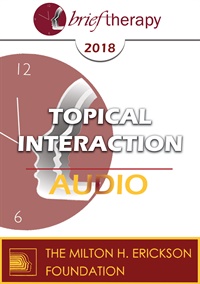
- Average Rating:
- Not yet rated
- Topic Areas:
- Topical Interactions | Brief Therapy | Communication | Evocative Communication | Resources
- Categories:
- Brief Therapy Conference | Brief Therapy Conference 2018
- Faculty:
- Bill O'Hanlon, MS
- Duration:
- 53:03
- Format:
- Audio Only
- Original Program Date:
- Dec 08, 2018
- Short Description:
- What can brief therapy work? In this session, Bill O'Hanlon will make the case that it involves evocation of already existing resources, so the client doesn't have to be fixed, taught new skills or make major changed to resolve problems.
- Price:
- $15.00 - Base Price
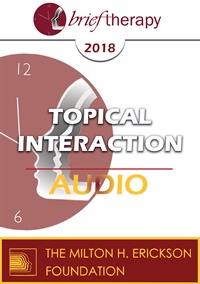
- Average Rating:
- Not yet rated
- Topic Areas:
- Topical Interactions | Anorexia | Eating Disorders | Bulimia | Brief Therapy
- Categories:
- Brief Therapy Conference | Brief Therapy Conference 2018
- Faculty:
- Camillo Loriedo, MD, PhD
- Duration:
- 1:00:27
- Format:
- Audio Only
- Original Program Date:
- Dec 08, 2018
- Short Description:
- Various attempts to treat these disturbances briefly have been made, but in most cases they proved to be unsuccessful due a very high relapse rate. To avoid a fearsome chronicity, a number of other factors, like alexithymia, low self-esteem, perfectionism, dissociation, dichotomous thinking, and others should be considered for treatment. Indications of how to deal with these factors in Ericksonian Brief Therapy will be offered.
- Price:
- $15.00 - Base Price
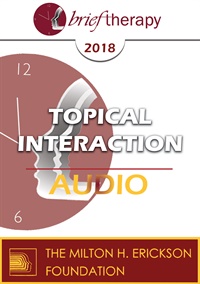
- Average Rating:
- Not yet rated
- Topic Areas:
- Topical Interactions | Psychotherapy | Brief Therapy | Therapeutic Relationship | Therapist Development
- Categories:
- Brief Therapy Conference | Brief Therapy Conference 2018
- Faculty:
- Stephen Gilligan, PhD
- Duration:
- 1:04:33
- Format:
- Audio Only
- Original Program Date:
- Dec 08, 2018
- Short Description:
- Every meaningful therapy conversation includes a significant presence of difficult emotions--symptoms, responses, anger, fear, etc. We will have a conversation about how to skillfully welcome and utilize such negative experiences as integral parts of a successful, creative therapy.
- Price:
- $15.00 - Base Price
Please wait ...


